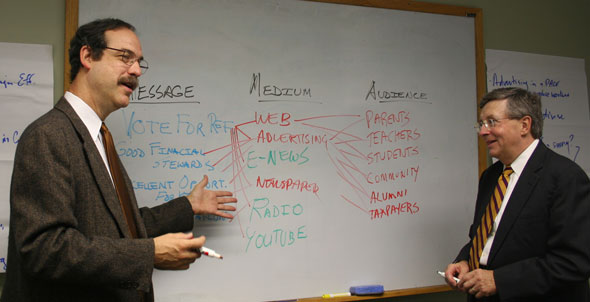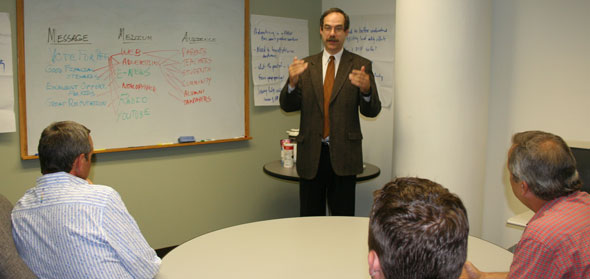Do you sometimes feel like you’re the only one on the block who hasn’t accepted a friend request on Facebook?
Relax. Even though it seems the whole world is on Facebook (and that’s not far from the truth), there are many execs, doctors and other professionals who haven’t dipped their toes in the social media water, and may see no reason to do so.
In many cases, I’ve found it’s a simple fear of the unfamiliar. I’ve met clergymen who are afraid they’ll post Tweet something that might embarrass their congregation and neighbors who think Facebook founder Mark Zuckerberg is keeping all of their personal information in a cardboard box in his basement.
Others simply worry that they might press the wrong button and cause all the oxygen to get sucked out of their house.
As in all friendships (well, most of them), greater familiarity with social media can make the online world feel more friendly.
We are witness to a media climate change of global proportions. Not a day goes by without Google adding a new feature or someone you know creating a LinkedIn profile. Regardless of your age or profession, you need to understand how the “new media” landscape will affect your business. Facebook adds or deletes a new feature every 37 seconds (or so it seems) and a bad-boy actor can amass 2 million followers on Twitter in a couple of days.
Jonathan Lehrer Communications, LLC, Can Help You
Get Comfortable with Social Media
Designed primarily for senior business executives and professionals, “Get Comfortable with Social Media” is a workshop we conduct in your office or a meeting of your professional association. Armed with an LCD projector and a list of Web sites, we’ll show you around the wilderness of social media and online tools that can help you deliver your organization’s messages to your various audiences.
The genesis for this seminar was a workshop Bob Herrick and I conducted for administrators of a large high school district. We were retained to help them write a job description and interview candidates for the position of public information officer.
In the “old days,” we explained to our clients, a suburban school merely needed to send a press release to the town’s daily newspaper and its major radio station. Today’s students, and quite possibly their parents, get their information from a million sources, some credible and some not.
The school honchos’ jaws dropped when we showed them their page on Wikipedia (they didn’t even know anybody had created such a page). We found an alumni group someone had created on Facebook (“I can’t believe THAT kid would be running our alumni group,” said an official). We explained the Facebook wall and we played videos of the school’s marching band that someone had uploaded to YouTube.
We tried to plot some of the message paths on a white board and ended up with a dizzying array of linkages that simply cannot be depicted in only two dimensions.

Jonathan Lehrer (left) and Bob Herrick show how new media and traditional media must be used together in a comprehensive communications plan.
No one can really be an expert on all this stuff. The landscape changes too quickly.
A Strategy for Social Media and Online Communication
Eventually, our school client hired a well-qualified PR person who understood the school well (and that’s really the most important thing) and was prepared to lead the institution into the Facebook-Google-YouTube-Twitter land creatively and fearlessly.
Every demographic segment – without regard to age or income level – is on the Internet somewhere. Whether you like it or not, they are formulating opinions about you, your products, your clients or the public policy issues that affect you.
Invite us to your office or your organization for a customized presentation about how new media consumers perceive you.
Ask us for help embracing the new media and finding your path through the challenges of global media climate change.
